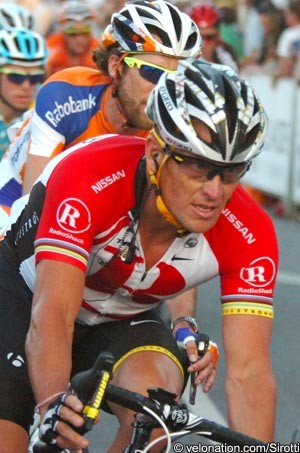 Ten days after the screening of the ’60 Minutes’ programme alleging widespread doping on the US Postal Service team, Lance Armstrong’s attorneys have demanded an on-air apology.
Ten days after the screening of the ’60 Minutes’ programme alleging widespread doping on the US Postal Service team, Lance Armstrong’s attorneys have demanded an on-air apology.
A wide number of claims were made during the programme, with former team-mates Tyler Hamilton and Frankie Andreu saying that Armstrong and others took banned substances and received blood transfusions.
The demanded apology relates to claims of a failed drugs test at the 2001 Tour de Suisse, with Hamilton stating that Armstrong told him that the UCI helped cover up the result. He also said that Armstrong and Johan Bruyneel met the head of the anti-doping laboratory in Switzerland, later reported as being Martial Saugy, and that details of test methods were provided to the duo.
“In the cold light of morning your story was either extraordinarily shoddy, to the point of being reckless and unprofessional, or a vicious hit-and-run job,” lawyer Elliot Peters said in a letter sent to ’60 Minutes’ executive producer Jeff Fager on Wednesday, according to AFP. “In either case, a categorical on-air apology is required.”
Saugy admitted last week that he met Armstrong and Bruyneel, but denied that the Texan had failed a drugs test. He said that some samples from the 2001 Tour de Suisse were suspected as being indicative of possible EPO use, but that he didn’t know if they belonged to the Texan.
However WADA directeur general David Howman has said that he is concerned by the notion that an anti-doping official in such a position met an athlete and his manager. He suggested that it was not normal protocol, and that it sent out the wrong message.
“You can’t have a situation where you have athletes going and having one-on-one conversations with labs, just for the mere perception that would be wrong,” he said on the 60 Minutes programme. “We can’t have a situation where athletes get preferential treatment, preferential information, or even meetings of that nature.”
60 Minutes said that at the meeting, testing procedures were discussed with Armstrong and Bruyneel. Howman said that this information be very valuable to someone trying to beat the test.
L’Equipe reported last week that anti-doping samples taken from Armstrong in the 2002 Dauphine Libere were also suggestive of possible EPO use.
The rider and the team itself are currently the subject of an investigation involving several federal agencies in the USA, as well as the US Anti Doping Agency. These are cooperating with investigators in Europe, who recently stated that Armstrong continued to work with Michele Ferrari until as late as last year.
He said in 2004 that he had formally cut all professional ties with the controversial Italian doctor. Armstrong’s spokesman confirmed on April 15th that he had been in contact with Ferrari, but said that it was as a friend only and not in an professional capacity. The 60 Minutes programme said however that Italian investigators had evidence that that large sums of money had been transferred to Ferrari as recently as 2010.
CBS News spokesman Kevin Tedesco wouldn’t comment today on the letter sent to the station by Armstrong’s lawyers, but stood over the programme as a whole. “We consider this the most thorough investigation into doping in the sport of cycling ever done,” he said.
Last week it was announced that Armstrong was adding Peters and another high-profile attorney, John Keker, to his legal team.
Two years ago, both helped Major League Baseball players win a key appeals court case against federal agents, including the current chief investigator into the US Postal Service allegations, Jeff Novitzky. A panel of federal judges ruled then that agents were wrong to seize baseball’s anonymous drug-testing results from 2003.